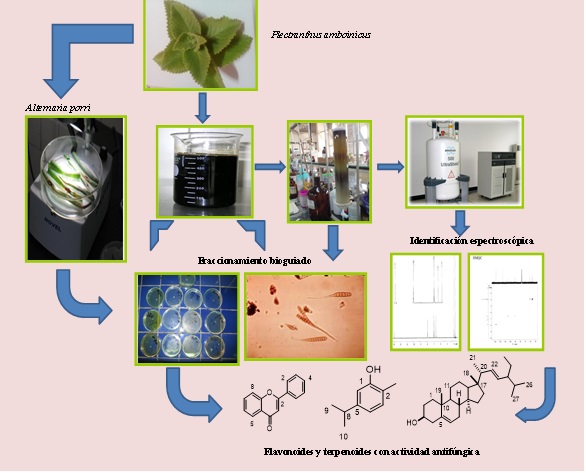Identificación de compuestos con acción antifúngica en extractos de hojas de Plectranthus amboinicus (Lour) Spreng
Palavras-chave:
Plectranthus amboinicus; Alternaria porri; flavonoides; terpenoides; antifúngico.Resumo
Este trabajo tuvo como objetivo identificar compuestos con actividad antifúngica frente a Alternaria
porri presentes en extractos de hojas del orégano francés (Plectranthus amboinicus). El extracto crudo
fue particionado consecutivamente en hexano, cloroformo, acetato de etilo y agua destilada estéril. La
bioactividad de las fracciones se evaluó mediante las técnicas de dilución en agar y gota colgante para
micelio y esporas, respectivamente. De las fracciones más activas, se separaron compuestos con el empleo
de cromatografía en columna y cromatografía de capa delgada. Los compuestos aislados fueron analizados
mediante Resonancia Magnética Nuclear de 1 H y 13C. La fracción clorofórmica y la hexánica fueron las más
activas, logrando disminuir alrededor del 50 % el crecimiento micelial e inhibir más del 90 % la germinación
de los conidios. De estas fracciones, se identificaron siete compuestos (flavonoides y terpenoides), de los
cuales seis mostraron actividad antifúngica, al igual que el aceite obtenido de la fracción hexánica.
Referências
KUMAR, P.; SANGAM y KUMAR, N. “Plectranthus amboinicus: A review on its pharmacological and pharmacognostical studies”. American Journal of Physiology, Biochemistry and Pharmacology. 2020, 10 (2), 55–62. DOI: http://doi10.5455/ajpbp.20190928091007
RODRÍGUEZ, Y. et al. “Efficacy of Plectranthus amboinicus (Lour) Spreng (French oregano) tablets in patients with common cold: a randomized, double-blind, placebo-controlled study”. Bionatura. 2016, 1 (4), 177-196. http://www.revistabionatura.com
DAR, A. et al. “Overview of purple blotch disease and understanding its management through chemical, biological and genetic approaches”. Journal of Integrative Agriculture. 2020, 19 (12), 3013–3024. DOI: 10.1016/S2095-3119(20)63285-3.
GORE, P.; INGLE, R.; RAKHORDE, P. “Management of Purple blotch of Onion caused by Alternaria porri” Journal of Plant Disease Sciences. 2021, 16 (1), 47-51. ISSN: 10976-2388.
OFICINA NACIONAL DE NORMALIZACIÓN (ONN). Norma cubana 26-94. Determinación de residuo de evaporación. Método de ensayo. La Habana, Cuba,1994.
ARONÉS, M.; CÁRDENAS, E.; LUNA, H.; BARBARÁN, S. GÓMEZ, M. “Tamizaje fitoquímico, contenido de compuestos fenólicos y potencial antioxidante de trece plantas medicinales de los afloramientos rocosos del bosque de piedras de huaraca en Perú”. Rev. Soc. Quím. Perú. 2022, 88 (1), 165-179. DOI: 10.37761/rsqp.v88i2.388.
RAHMAN, A.; IQBAL - CHOUDARY, M.; THOMSON, W. Bioassay techniques for drug development. First Edition, USA, Harwood Academic Publisher, 2001. ISBN 90-5823-051-1. http://www.gbhap.com
KUMARESAN, K. et al. “Broad spectrum action of phenazine against active and dormant structures of fungal pathogens and root knot nematode”. Archives of Phytopathology and Plant Protection. 2005, 38 (1), 69–76. DOI: 10.1080/0323540040008408.
MESQUITA, A.; CORRÊA, D.; PÀDUA, A.; GUEDES, M.; GOTTIEB, O. (1986). “Flavonoid from four Compositae species”. Phytochemistry.1986, 25 (5), 1255-1256. DOI: https://doi.org/10.1016/50031-9422(00)81599-X
RGASA, C.; PENDON, Z.; SANGALANG, V.; RIDEOUT, J. “Antimicrobial flavones from Coleus amboinicus”. Philippine Journal of Science. 1999, 128 (4), 347-351. ISSN 0031-7683.
LIU, S. et al. “Anticancer activity and quantitative analysis of flavone of Cirsium japonicum D.C.” Natural Product Research.2007, 21 (10), 915 -922. DOI: https://doi.org.10.1080/14786410701494686
SAEIDNIA, S.; MORADI - AFRAPOLO, F.; GOHARI, A.; MALMIR, M. “Cytotoxic flavonoids from Achillea talagonica Bioss. “Journal of Medicinal Plants. 2009, 8 (5), 52-56. DOI: (20.1001.1.2717204.2009.8.29.28.9) jmpir-v8n29p52-fa.pdf.
SAHÍN, P.; EZER, N.; ÇALIS, J. “Terpene and phenolic compounds from Sideritis stricta”. Turkish Journal of Chemistry. 2006, 30, 495-504. DOI: https://jourmals.tubitak.gov.tr/chem/vol30/iss4/10
HASSANI, MS.; ZAINATI, I.; ZRIRA, S.; MAHDI, S.; OUKESSOU, M. “Chemical composition and antimicrobial activity of Plectranthus amboinicus (Lour) Spreng essential oil from Archipelago of Comoros”. J Essent Oil Bear Plants. 2012, 15 (4), 637–44. DOI: https://doi.org/10.1080/0972060X.2012.10644098
ARUMUGAM, G.; SWAMY, M.; SINNIAH, U. “Plectranthus amboinicus (Lour.) Spreng: botanical, phytochemical, pharmacological and nutritional significance.” Molecules. 2016, 21, 369. DOI: https://doi.org/10.3390/molecules21040369
XIE, D.; WANG, L.; YE, H.; LI, G. “Isolation and production of artemisin and stigmasterol in hairy root cultures of Artemisia annua”. Plant cell, Tissue and Organ Culture. 2000, 63, 161-166. DOI: https://doi.org/10.1023/A:1006438919841
SHARP, H. et al. “6-oxigenated flavones from Baccharis trinervis (Asteraceae)”. Biochemical Systematic and Ecology. 2001, 29 (1), 105-107. DOI: 10.1016/S0305-1978(00)00019-3.
SEN, A.; TURAN, S.; BITIS, L. “Bioactivity-guided isolation of antiproliferative compounds from endemic Centurea kilaea”. Pharmaceutical Biology. 2016, 55 (1), 541-546. DOI: 10.1080/13880209.2016.1255980.
ZAMANI, S.; HOSSIENI, M.; ETEBARI, M.; SALEHIAN, P.; EBRAHIMI, S. “Pharmacokinetics of calycopterin and xanthmicrol, two polymethoxylated hydroxyflavones with anti-angiogenic activities from Dracocephalum kotschyi Bioss”. DARU Journal of Pharmaceutical Sciences. 2016, 24 (22). DOI 10.1186/s40199-016-0161-x.
LEE, D. et al. “Protective effect of cirsimaritin against streptozotocin-induced apoptosis in pancreatic beta cells”. Journal of Pharmacy and Pharmacology. 2017, 69 (7), 875-883. DOI: https://doi.org/10.1111/jphp.12719
LI, S. et al. “Antifungal activity of camptothecin, trifolin, and hyperoside isolated from Camptotheca acuminata.” Journal of Agricultural and Food Chemistry. 2005, 53 (1), 32-37. DOI: https://doi.org/10.1021/jf0484780
SHARMA, B.; KUMAR, P. “In vitro antifungal potency of some plant extracts against Fusarium oxysporum”. Internacional Journal of Green Pharmacy. 2009, (January – March), 63-65. DOI: 10.4103/0973-8258.49377.

Downloads
Publicado
Como Citar
Edição
Seção
Licença
Copyright (c) 2024 Yoannia G. Pupo-Blanco, Eleuterio Burgueño-Tapia, Dina I. Malheiros-Dinis de Mendonca, Belyani Vargas-Batis

Este trabalho está licenciado sob uma licença Creative Commons Attribution-NonCommercial-NoDerivatives 4.0 International License.
Esta revista oferece acesso aberto imediato ao seu conteúdo, com base no princípio de que oferecer ao público o acesso gratuito à pesquisa contribui para uma maior troca global de conhecimento.






















